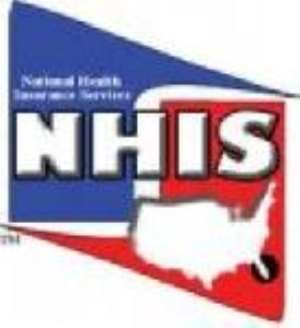
The National Health Insurance Council (NHIC), has released ¢324 billion to all the district schemes which are indebted to health institutions to settle their outstanding debts.
The amount also includes third quarter of subsidy for the operation of the schemes.
Scheme managers have therefore been instructed to immediately pay all outstanding debts to accredited hospitals, clinics, pharmacies and other facilities and report back to the Council.
The scheme managers are to send bank statements accompanying all payments to the Chief Executive of the scheme, who would in turn, report to the President.
These were announced by Ras Boateng, the Chief Executive of the scheme at the first annual general meeting of the Kwaebibirem Mutual Health Insurance Scheme at Kade in the Eastern region on Tuesday.
He warned officers of the scheme to ensure that the monies were not diverted, stressing that officers who misappropriated funds would find themselves in uncomfortable situations.
He told the general meeting that zonal offices were being established to serve as vital links between the Council and the District Health Insurance Schemes.
“The zonal offices are to monitor the operations of the schemes effectively, ensure uniformity in their operations and check fraud at the scheme and provider levels,” Mr. Boateng explained.
The chief executive said the zonal offices are currently being staffed and therefore asked personnel of the district schemes to co-operate fully with officials of the zonal offices to bring about increased efficiency in the implementation of the scheme.
The NHIS chief executive said the scheme was taking serious steps to address the problems of manual entering of registration and claims as well as the excessive pressure on the service providers.
The scheme has introduced an ICT programme, which would ensure universal portability and quality of service as well as human capacity development for improved financial and operational management.
According to him, the ICT project will also ensure electronic claims submission, vetting, adjudication and payment, as well as introduce controls to minimise fraud.
He said the NHIS remains the best and most secure social welfare package the NPP government has ever introduced, and is seen as one of the key pillars in reducing poverty.
“Everywhere, card-bearing members are singing the praises of the government,” he added. The highest cost of medical care incurred by the scheme for a single member is ¢95 million.
The Minister of Health, who was represented by Kofi Adusei from the Ministry, stressed on the need for Ghanaians to change their attitude towards health and adopt regenerative health practices.
He said because of bad eating habits, life expectancy in Ghana was just 57 years, while Ghanaians could live up to 100 years if preventive health could be pursued.
He said Ghanaians must exercise at least twice a week, have enough rest, avoid too much carbohydrates, salt, sugar and unprotected sex while obeying basic environmental rules.
The district manager, John Awuku Ahevi said the scheme would intensify sensitisation in order to increase enrolment to 100 percent in the shortest possible time, and also ensure speedy processing of ID cards by engaging services of casual workers.
The Kwaebibirem Mutual Health Scheme has been a big success story since it started operating four years ago.
The scheme, which is one of the best in the country, has registered 63% of the population of the district and has well-laid-down structures.
Service providers which serve the scheme are St. Dominic and GCD Hospitals at Akwatia; Oda Government and Kade Hospitals; Asuom, Pramkese, New Abirem and Takorase Health Centres, and the Salvation Army Clinic at Akyem Wenchi.




 Tuesday’s downpour destroys ceiling of Circuit Court '8' in Accra
Tuesday’s downpour destroys ceiling of Circuit Court '8' in Accra
 SOEs shouldn't compromise on ethical standards, accountability – Akufo-Addo
SOEs shouldn't compromise on ethical standards, accountability – Akufo-Addo
 Father of 2-year-old boy attacked by dog appeals for financial support
Father of 2-year-old boy attacked by dog appeals for financial support
 Jubilee House National Security Operative allegedly swindles businessman over sa...
Jubilee House National Security Operative allegedly swindles businessman over sa...
 Nobody can order dumsor timetable except Energy Minister – Osafo-Maafo
Nobody can order dumsor timetable except Energy Minister – Osafo-Maafo
 Mahama wishes National Chief Imam as he clock 105 years today
Mahama wishes National Chief Imam as he clock 105 years today
 J.B.Danquah Adu’s murder trial: Case adjourned to April 29
J.B.Danquah Adu’s murder trial: Case adjourned to April 29
 High Court issues arrest warrant for former MASLOC Boss
High Court issues arrest warrant for former MASLOC Boss
 Align academic curriculum with industry needs — Stanbic Bank Ghana CEO advocates
Align academic curriculum with industry needs — Stanbic Bank Ghana CEO advocates
 Election 2024: We'll declare the results and let Ghanaians know we've won - Manh...
Election 2024: We'll declare the results and let Ghanaians know we've won - Manh...
